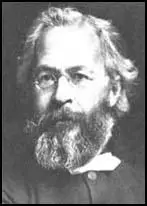Charles Henry Parkhurst

Charles Henry Parkhurst was born on a farm in Framingham, on 17th April 1842. After graduating from Amherst College in 1866 he studied theology at the University of Halle-Wittenberg.
After marrying Ellen Bodman became a professor at the Williston Seminary in Easthampton, Massachusetts. He spent time in Leipzig before being appointed as pastor of the Congregational Church at Lenox (1874-80) and the Presbyterian Church in New York City (1880-1918). He became interested in municipal affairs and in 1891 was elected as president of the Society for the Prevention of Crime.
In February, 1892, Parkhurst made a tremendous impact on the people of the city with a powerful sermon attacking Tammany Hall corruption. It included the statement: "while we fight iniquity, they shield and patronize it; while we try to convert criminals, they manufacture them." Parkhurst continued to campaign against Richard Croker, the mayor of New York City, and in 1901, helped to get Seith Low, elected to power.
Lincoln Steffens claimed that: "He (Charles Pankhurst) sounded like a prophet of old in his sermons, but personally he was a calm, smiling, earnest, but not unhumorous gentleman whn frankly enjoyed his notoriety and his exposures. He knew some of the doings of the police; they were dangerous facts to allege; libelous. He had to be careful, and he was cautious, but he was persistent, methodically, thoroughly. He organized in and out of his congregation a society to investigate the police, procure evidence, and put him in a position to describe New York police methods and their relations with Tammany Hall, the liquor interests, and criminals."
Charles Parkhurst, who wrote several books, including The Blind Man's Creed (1883), Pattern in the Mount (1885), Our Fight With Tammany (1895) and an autobiography, My Forty Years in New York (1923), died on 8th September, 1933 by sleepwalking and walking off the porch roof in his home in Ventnor, New Jersey.
Primary Sources
(1) Lincoln Steffens, Autobiography (1931)
The Rev. Dr. Charles H. Parkhurst was discovering the corruption of the police and denouncing the force from his pulpit. He sounded like a prophet of old in his sermons, but personally he was a calm, smiling, earnest, but not unhumorous gentleman whn frankly enjoyed his notoriety and his exposures. He knew some of the doings of the police; they were dangerous facts to allege; libelous. He had to be careful, and he was cautious, but he was persistent, methodically, thoroughly. He organized in and out of his congregation a society to investigate the police, procure evidence, and put him in a position to describe New York police methods and their relations with Tammany Hall, the liquor interests, and criminals. The Post was interested, of course, in anybody that came out openly against Tammany; there was some suspicion of a clergyman who "profaned his pulpit with police filth," even as against Tammany; and my first assignments to see Parkhurst were reluctant. Dr. Parkhurst talked moderately, sen¬sibly, briefly, and, as I reported him, in tone with the paper. Following up a police news lead, as I always did, I called on him every few days; we became rather friendly, and I was soon able to warn my chief of news to come; which came at police headquarters. Mr. Wright had seen, I think, that Dr. Parkhurst offered him a good excuse for assigning a reporter to police headquarters: to report the police side of an opening controversy; and since the clergyman and I seemed to get along well together I was the man to go.
"Not to report crimes and that sort of thing," said Wright, in effect. "You will keep in touch with Dr. Parkhurst, know what he is doing, and work in with him for the purpose of reporting his findings with the police department for a background." But I got from him somehow the idea that, if I could find a way, not a sensational, conventional, but, say, a political, a literary, way to write about robberies, murders, etc., I might try putting some crime into the Post.
